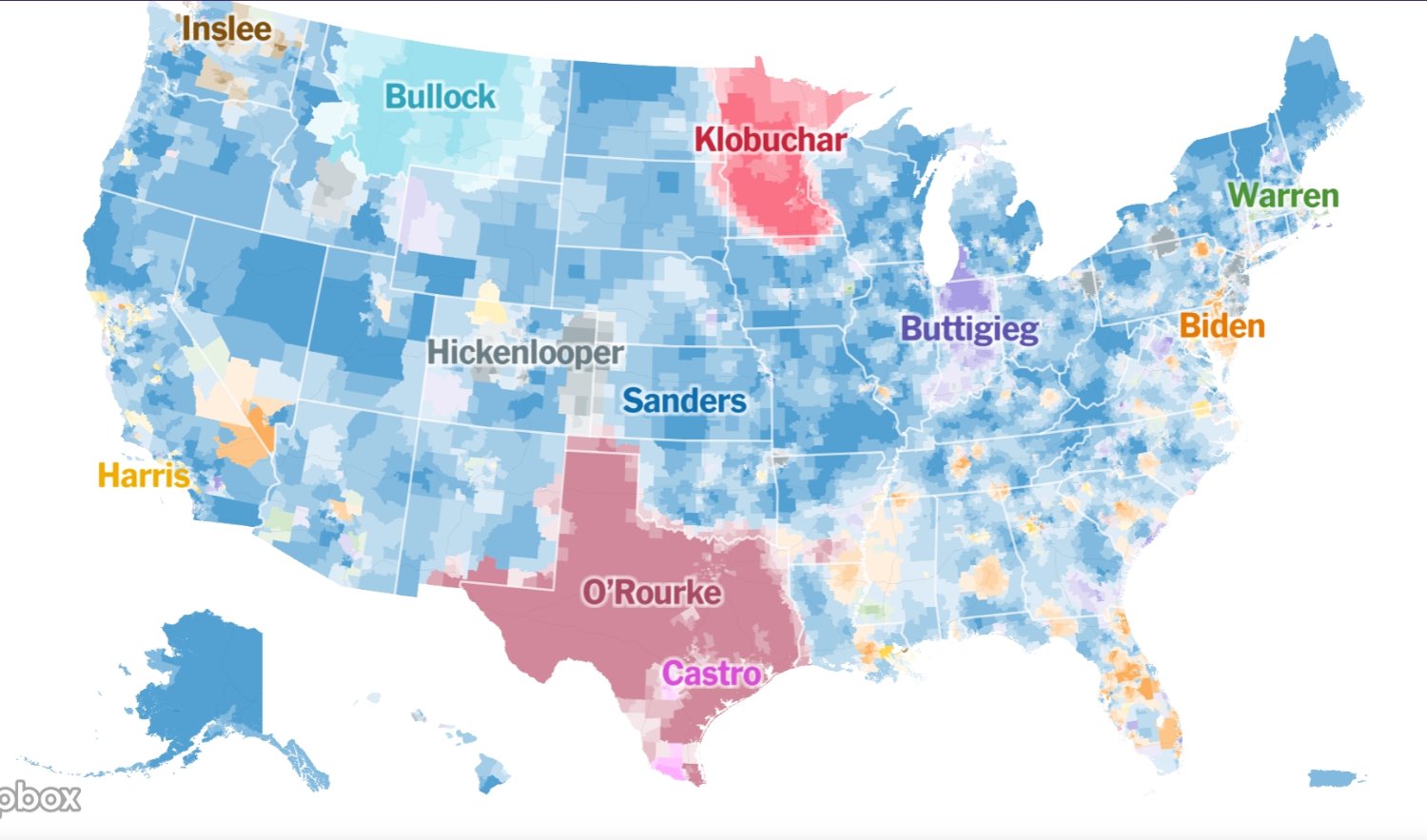For example, let’s say Bernie Sanders was the nominee in 2024 against Trump. A lot of people on the internet seem to like him, even some conservatives. But would liberals fall in line and vote for him enough to beat Trump?
Bernie’s supporters always seem to attack the Democrats liberal base, do you think they’d sit home if Bernie or any leftist was the nominee.
The DNC will never let a leftist get past the primaries. They’d sooner lose, as they’ve shown us for the last 3 elections.
A lot of people don’t know the difference between establishment Democrats and liberals.
I know there is a difference, but…if the purpose of a system is it’s end result then is there a difference?
Maybe, but that’s not the question.
No. And they’ve said as much.
“Clinton would not pledge to support Sanders if he won the 2020 Democratic nomination.”
https://abcnews.go.com/Politics/hillary-clinton-sen-bernie-sanders-likes/story?id=68424746
“However – I do reject socialism as a economic system. If people have that view, that’s their view. That is not the view of the Democratic Party.” - Pelosi
https://edition.cnn.com/2019/04/15/politics/nancy-pelosi-socialism/index.html
It’s so sad to see this, especially knowing that while you can like or dislike Clinton and Pelosi, I doubt they are unware that Sanders is not proposing socialism. Socialism and social democracy are two very, vastly different things. And they for sure know this very well.
I sincerely hope that Sanders will found a new party soon, it will have 4 years to gain momentum. Will it win in the next election cycle? No, but it might actually get enough votes to win in 8 or 12 years. Just do it.
Does Sanders have enough life left in him to develop a far-left party? How will it differ from the existing left-leaning third-parties? How would the party stand out and “matter?” Relevant XKCD
I ask these things as a perennially disappointed minarchist classical liberal.
I’m not sure how much these endorsements actually matter… Lord knows Liz Cheney’s endorsing Kamala didn’t tip the scales.
Would establishment libs support a leftist? Maybe not. But that doesn’t mean that voters would necessarily follow suit.
That’s a fair point.
Your link is Clinton saying she won’t say before the primary is over whether she would support Sanders. It’s not even her saying she wouldn’t do it, let alone all liberals saying it.
The amount of disinformation spread here is amazing.
Let me put it this way… Here’s the 2020 DNC primary donations:

You know when conservatives post pictures of counties being all one color thus showing significant voting support most people speak up about how land doesn’t vote and explain why those maps are kind of useless. Just food for thought.
my thought immediately when seeing this. interesting to see the geographic spread but misleading to frame it as more area = more popular
This is not colorblind friendly at all.
Yeah, that’s terrible color choice (I’m assuming, anyway, since Pete and sanders are presumably meant to be different colors)
It also lacks a key
You’re doing it too… terrible choice of first name vs last
“not being able to tell the difference between something literally at all” is definitely the same as “referring to candidates both of whom you could differentiate between”. He went by “mayor pete” and I could not remember how to spell his late name.
Bud, you’re still doing it.
“I did it that way because I can’t be bothered to do it right.”
man where’s yang
Most people have no idea a leftist isn’t just a weirdo way of saying liberal
No. They would be morons and vote against socialism even if it’s good for them.
We know the answer to that from how Bernie was treated
No. Liberals have always been closer to fascists than socialists. Look which way liberals in Weimar Germany went.
The word “liberals” means something else in Germany than in the US. The closes analogy would be Democrats=SPD and Republicans=CDU, which are the two biggest parties. When Hitler took over, the CDU fell in line while the SPD resisted. The SPD then was also a lot more leftist than it is now. It’s pretty much centrist now and only slightly more to the left than the conservative CDU.
Back then, the SPD had politicians with a backbone made of steel! Hitler tried to intimidate the members of parliament by having the SS and SA surround the building (Krolloper), and for the most part, this tactic worked. However, Otto Wels and the SPD stood firm and voted against the ‘Ermächtigungsgesetz’ (Enabling Act). In his famous speech, Wels declared: ‘You can take away our freedom and our lives, but not our honor.’ Many SPD members paid the ultimate price for their courage, and Otto Wels himself died in exile in France in 1939.
deleted by creator
My headcanon:
Leftist: One who supports the general ideas of the Democratic party and supports the people at the head and their usual goings-on, voted Harris, enjoy the color blue.
Liberal: A Leftist, but they don’t think their party speaks for them enough, or aren’t extreme enough on certain issues they don’t think are represented enough, so they think the party has abandoned or doesn’t speak for them. These can be anyone from lgbtq+ activists to worker unions to Bernie Sanders. The idea that the left has left you, or whatever you stand for, and you are the liberal left.
Liberal(2nd definition): Someone who’s into traditionalist communist ideals, Lemmy calls them “tankies”. These tend to… not be what most people are talking about when they say liberal, despite arguments to the contrary.
Correct me if I’m wrong, this is in the context of the USA.
You got liberals and leftist mixed up
I don’t at all understand how you got your definition of “liberal”. I think anyone who could conceivably be called a “tankie” would bristle at being called liberal.
Liberalism is a political and moral philosophy based on the rights of the individual, liberty, consent of the governed, political equality, right to private property and equality before the law.[1][2] Liberals espouse various and often mutually warring views depending on their understanding of these principles but generally support private property, market economies, individual rights (including civil rights and human rights), liberal democracy, secularism, rule of law, economic and political freedom, freedom of speech, freedom of the press, freedom of assembly, and freedom of religion.[3] Liberalism is frequently cited as the dominant ideology of modern history.
Both of our American parties are liberals. However, most Americans use the word to mean “progressive”.
I think “Leftist” starts at anti-capitalism and goes from there. I half jokingly say a progressive is someone who thinks the system is broken and must be fixed. A Leftist is someone who thinks the system is working exactly as intended and must be destroyed.
To throw one more into the mix:
“Left” and “Right” came from the UK parliamentary system where the representatives of the two major parties sat on the left and right side of the speaker of the house in the House of Commons.
It just so happened that the ones on the right had conservative values (keep things as they are, don’t spend what we don’t have, local economy first, preserve traditional values) while those seated on the left had liberal values (let’s make things even better, spend for the future, improve the global economy, make life better for all our constituents).
That was the starting point for what it’s all morphed into today.
https://en.m.wikipedia.org/wiki/Left–right_political_spectrum#Western_Europe
The left–right political spectrum is a system of classifying political positions, ideologies and parties, with emphasis placed upon issues of social equality and social hierarchy. In addition to positions on the left and on the right, there are centrist and moderate positions, which are not strongly aligned with either end of the spectrum. It originated during the French Revolution based on the seating in the French National Assembly.
You damn Brits can’t have that one for the National Museum!
In the context of Germany, “liberal” means being for capitalism unbridled by the state but still generally progressive policies culturally, with more rights for minorities and such. The corresponding party is FDP. So in some ways it’s the exact opposite of the US idea of “liberal”.
Someone considered “left” would be for more social policies and government control of capitalism (traditionally SPD), extreme left would be following tenants of communism, opposed to the US and friendly with Russia (The party The Left and the new Sarah Wagenknecht party)
Someone considered conservative or “right” would be against social policies and try to reduce control of capitalism (CDU) extreme right would be plain fascists (AfD), ironically also aligned with Russia now.
The Greens are a special case, since they were originally a single issue party concerned with environmentalism, but since the SPD has largely vacated their social policies since Schröder was chancellor, they have become more and more the new “social” party.
There are also a huge number of smaller parties that are unable to reach more than five percent, which is necessary to be included in the govenmental body of the Bundestag. Most of those are single issue parties (there is even a beer party). The FDP has become so unpopular that it might also share that fate soon.
To come back to your original point, there were no “liberals” when Hitler was elected. There were conservatives, socialists and communists. The conservatives aligned themselves with the fascists and the socialists and communists were outlawed and thrown into jail/executed.
Lol wut?
I agree, that didn’t make sense on its surface. By definition, liberalism and fascism are at odds. According to Wikipedia,
Liberalism: A political and moral philosophy based on the rights of the individual, liberty, consent of the governed, political equality, right to private property and equality before the law.
Fascism: A far-right, authoritarian, and ultranationalist political ideology and movement, characterized by a dictatorial leader, centralized autocracy, militarism, forcible suppression of opposition, belief in a natural social hierarchy, subordination of individual interests for the perceived good of the nation or race, and strong regimentation of society and the economy.
Now, if I had to guess at what OP meant, perhaps it’s that America’s Liberals are more closely aligned with its Conservatives (who are not all fascists yet but are rapidly embracing fascism over the past decade, probably longer) than they would be with pure leftists (as in full-on Socialists/Communists, which Bernie, a Social Democrat, is not). Best recent evidence I can think of for this is the DNC actively colluding against Sanders in the primaries of 2016 and 2020 and consciously omitting leftist policy from their platform in 2024, instead replacing it with moderate Republican policies.
In short, I believe mainstream Democrats would endorse Republicans if it meant keeping a true leftist from power.
They totally would, until they disagreed with a single one of his policies.
Would liberals support him? Sure.
Would liberals support her? No.
This is the real answer.
Too many white and hispanic men feel too insecure to vote for a woman.
Yup. And not just those voters. It’s an issue in most groups.
There are even plenty of women that won’t vote for a woman.
Nobody agrees on what those words mean so it’s a confusing question. Clearly he would have had a better chance of winning.
Assuming Bernie could get on the ticket, I absolutely believe people would have voted for him.
The problem is of course getting him on the ticket.
You think liberals would vote for him?
I think if he made the democratic nomination in 2016 he’d be finishing his second term right now.
Liberals already tried to get Bernie on the ticket in 2016, but the DNC fucked us on that.
I think Liberals kept him off the ticket.
Liberal voters wanted Bernie. The DNC did not.
People are using liberal in two different ways here. Most Americans call anything to the left of Republican liberal. Most of Lemmy considers liberal to be center-right and leftist to be Bernie style liberal.
In this case, they were saying that the Democratic elites (liberals) didn’t want Bernie to win, while the true progressive left (leftists) did.
Thanks for explaining to dude. It’s so frustrating talking about anything with politics here in the US. A big part of that is we don’t have shared definitions of what terms mean. That’s not even taking account of the just pure, willful ignorance of a good percentage of the population.
And 2020.
I think democrats would, for the most part. Perhaps less enthusiastically, but since they hate Trump, I think it would not be a major issue.
The question is, how would low-information unaffiliated voters respond to having a socialist in the ballot? This is a difficult question to answer. Traditionally socialism is a bad word in US politics, albeit less so with younger voters.
Personally I don’t really buy the “Bernie would have won” stuff but there’s really only one way to find out.
I don’t think a Demo candidate can afford to have low enthusiasm amongst liberals, that’s their biggest base.
Except all the liberals insisted they would vote for Biden’s corpse before letting Trump win. What does it say about them if an actual progressive is the real dealbreaker?
Nothing good, but nothing surprising.
True
Time travel?
I sincerely have no idea.
The narrative that a leftist couldn’t win is repeated so predictably and so often and by so many people that the whole idea has become sort of detached from reality, and there’s no telling what would happen if it was actually a possibility.
And particularly since the one thing I’d pretty much guarantee is that the concerted efforts on the part of the ruling class to prevent a leftist from running would be as nothing compared to what they’d do and say in order to prevent one from winning.
I read somewhere on Lemmy, the idea of running as a ‘Radical Republican’ and push leftist policies. Just focus on working class issues and nepo-wealth corruption in the business world. That might help win over the same disenfranchised that helped trump win.
Yes, but that’s keeping in mind that, contrary to popular belief among the types that go on Lemmy, most people aren’t ideological. They don’t care that Democrat A is this and Democrat B is that, they care about who they think will help their lives, ideology be damned. So, a lot of the people that socialists would call “libs” would vote for Bernie, BUT, most of those people think of Sanders primarily as “more liberal.”
People who are actively aware of the difference between neoliberalism and social democracy, I’m not sure. But I honestly think they’re a rounding error in US politics.
Socialists are very, very aware that the oppressed masses of people that don’t know what words mean love socialist policies when they don’t know they’re socialist.












